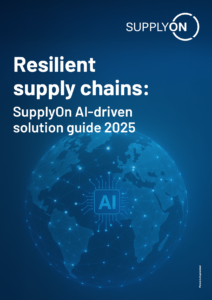Interview: “Blockchain offers enormous potential for supply chain management”

Ralf Knobloch, the SupplyOn Group’s blockchain expert, has been involved with distributed ledger technology since 2013. As the founder of the “Blockchain Meet-Up Saxony”, he is a great believer in regular dialog between research, science, users and society. We spoke to him about the impact of the new technology and about concrete use cases in supply chain management beyond the blockchain hype.
Ralf, you’ve been looking very closely at the possibilities offered by blockchain technology for several years now – not just professionally but privately, too. What do you find so fascinating about this technology?
I firmly believe that the whole area of blockchain is still very much in its infancy – we still can’t begin to imagine the scope of its impact. If you compare it to the beginnings of the internet, blockchain technology is where the internet was in the early 1990s, around 1994. It was a time when many companies didn’t have their own website and were still discussing whether or not it was really worth it having one. Today it would be inconceivable. However small a company today: if it doesn’t have a presence on the World Wide Web, it might as well not exist. The internet has not only brought radical change to the way we do business. It has also changed our society, our values – our entire lives. I anticipate that the possibilities of distributed ledger technology will cause similar upheaval.
What makes blockchain technology so special? Where do you see its disruptive potential?
The blockchain stores information in a network on a decentralized basis so that it essentially cannot be manipulated. This gives us the ability to do something that was previously inconceivable: trust strangers. Wherever a third instance or intermediary was once required to establish trust, this trust can now be created using blockchain technology. You can tell this subject is highly relevant to society at large because it’s not just something IT experts are interested in: it has also regularly been on the agenda at the World Economic Forum in Davos since 2016, for example.
Moving from the ‘Internet of Information Copies’ to an ‘Internet of Genuine Values and Originals’
How will blockchain technology impact supply chain management?
I expect the blockchain to penetrate many areas and turn a lot of things upside down – in fact, I predict an internet of genuine values and originals, not an internet of information copies as we have today. But it always depends on the specific case. Supply chain management tends to involve processes between companies that know each other and generally trust each other. To take a simple example: in the case of an order, the blockchain doesn’t offer any advantages, so it would not make sense to use it. It is of interest where a process requires an intermediary to establish a basis of trust – such as a customs authority or a notary, for example. There is enormous potential to tap into here – and this applies to supply chain management, too.
What does this mean from the point of view of SupplyOn?
For SupplyOn this means looking very closely at each use case in advance and critically assessing the benefits of the technology in each individual instance. And this is precisely what we are doing: we are getting together with the customer to take a very close look at the processes in question. We only pursue the matter in greater depth where blockchain technology offers a functional or economic value-add – or ideally both. In other words, we run a proof of concept with the customer so as to determine the effectiveness, feasibility and cost efficiency of the project. Only if the benefits outweigh the costs do we implement the use case.
Which evaluation criteria do you apply?
First of all we look at whether the use case involves several parties drawing on a shared data base. A supply chain essentially meets this criterion by its very nature. Then the question arises as to whether a third instance has a role to play in the process – for example an intermediary such as a customs authority or a bank for the exchange of funds. If this applies, the use case is then examined from the point of view of profitability. It would go beyond the scope of this interview to explain the entire decision-making tree, but I’ll be more than happy to explain it in a separate blog post shortly.
First blockchain pilots in 2019
Are you already seeing use cases that meet these criteria and have a chance of being implemented by SupplyOn?
Absolutely. Areas such as the traceability of parts, certificate issue and contract management – these definitely have a good chance being put into practice. We are currently working with customers to evaluate the first use cases on a proof-of-concept basis. I expect us to start implementing the first concepts as pilot projects at the beginning of 2019.
Ralf, thank you so much for these insights into such a fascinating and groundbreaking subject area. We look forward to reading more from you about blockchain technology and its application in supply chain management in the months to come.
Incidentally, the next Blockchain Meet-Up Saxony is due to take place in Dresden on January 9, 2019. Discussion on this occasion will focus on the question: “Blockchain and supply chain management – are they compatible?”
Interested? Click here to sign up and find out the full agenda (in German only): https://www.meetup.com/de-DE/BlockchainMeetupSaxony/events/255768124/




